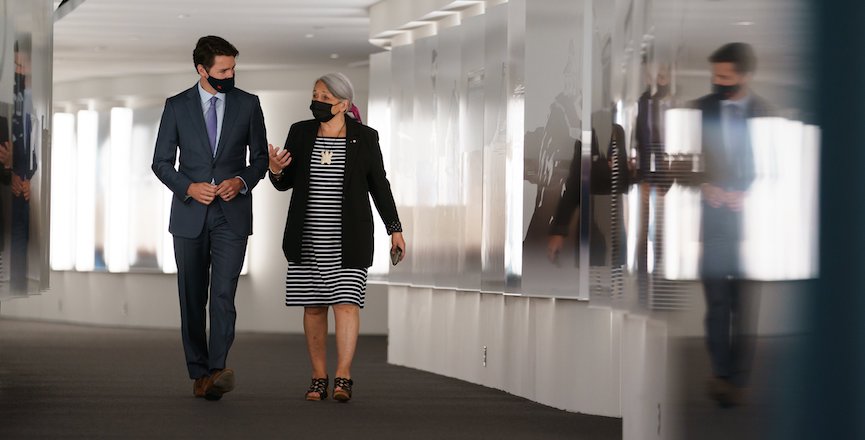This is one of those times (the others are, well, all the others) when the symbolic nature of being human is highly apparent. I’m thinking, for instance, of the mania in Quebec about the Canadiens, till it came crashing down Wednesday, or the related despondency in Toronto at the end of this year’s Leafs reverie.
I’m also picturing English fans’ faces at the Euro cup. Look at them! They point at themselves with each goal or win as if to say: Look what I did!
That’s what I mean by our symbolic nature: we yearn to be part of something larger. As the glorious, long dreamt-of final neared, ITV’s commentator said: “Not since 1967. Black-and-white telly!” History is awesome and we, now, are a living part.
For me it struck even more powerfully at the end of the press conference announcing Mary Simon’s appointment as Governor General. She began with a lengthy scripted statement — versus the usual few phrases — in Inuktitut, followed by an English peroration with gracious apologies for not being fluent in French.
Then, for questions, she went off script and finished perhaps thinking she should strike a hopeful note. So she started to express a conventional faith in the future, saying, “I see a very…”
She suddenly interrupted that thought, as if a voice in her head barked, “C’mon Mary, get real, these people know about the unmarked kids’ graves being unearthed, don’t sound naive,” and said: “I mean, maybe not in my lifetime…” and then she chuckled. Why chuckle? This is the cosmic irony: we won’t be here, yet the thought of it happening is deeply, truly comforting.
So she concluded: “But I see a very bright future for our children and grandchildren.” It is chuckleworthy: no iota of us as conscious individuals will survive, yet the thought of that future happening is satisfying, since somehow we’re part of it. You are incomprehensibly contained in the future of entities — like your family, nation or species — of which you were a mere transitory moment.
A CBC radio host asked snottily if Simon were “just a symbolic appointment.” Hold on there, what do you mean by “just”? The symbolic relation to that larger whatever is what tends to keep us going when the rest comes up short.
So I don’t think of items like the Euro cup and a GG appointment as mere symbols or, as the CBC host also suggested, Liberal tricks meant to distract everyone from harsh realities. (“We aren’t easily distracted,” said one of his Indigenous guests, with icy calm.) There’s a German term, Gattungswesen, that I encountered ages ago when I was poring through a long-lost Marxist text. I sat and stared at it hoping some meaning would emerge. Literally, it’d translate as “species-being” or something like that. Well, I now realize, exactly that.
Language is an almost entirely symbolic faculty that people are often ready to die for. Next to loss of their land — their place in space — loss of language is one of the great punishments inflicted on Indigenous peoples. Try living without yours for even a few weeks. Every other disaster follows. I’m currently reading a book, A Sense of Self, by psychiatrist Veronica O’Keane, that says no one has a single memory of themselves that isn’t located in a particular place. When you lose your place in space, your language may be your last remaining home. So it was entirely apt for Mary Simon to not only talk about her language, but speak it.
I am, BTW, tickled to learn that Simon is married to Whit Fraser, one of the memorable names in CBC journalism. Simon also worked there early on. John Ibbitson suggests there’s something sinister in the Liberal-CBC nexus, since five of the last eight GGs also worked there. But really, if you’re in comms or culture here, it’s hard not to wash up at the CBC. I did, at times, and Ibbitson till recently could be found there on most Sunday mornings. It’s the Hudson’s Bay Company of Canadian culture, and Whit Fraser is one of its bywords. There could be a CBC drama series called “Whit Fraser, CBC Reporter.” I wonder if there already was.
Rick Salutin writes about current affairs and politics. This column was first published in the Toronto Star.
Image: Justin Trudeau/Twitter



